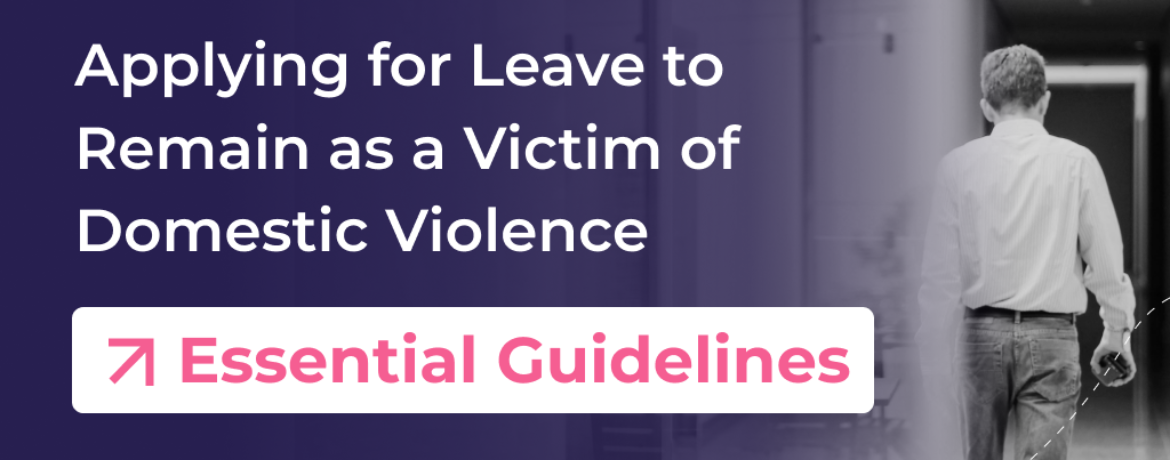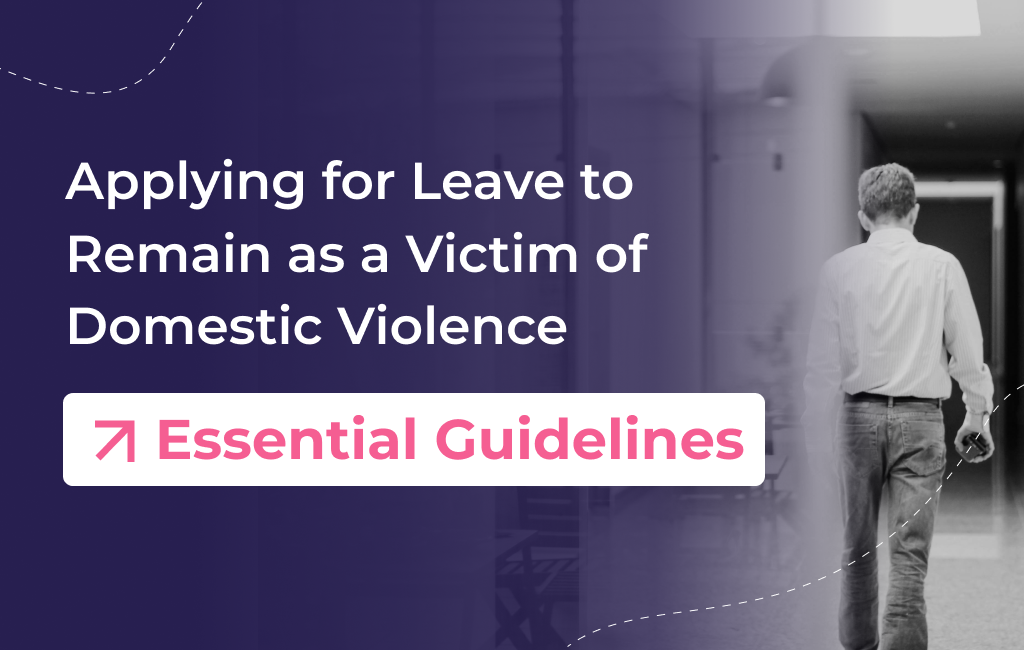
Applying for Leave to Remain as a Victim of Domestic Violence: Essential Guidelines

Domestic violence is a grave violation of human rights, impacting individuals regardless of gender, background, or social status. While predominantly affecting women, its reach extends to people from all walks of life, including migrants, who often face additional barriers due to their vulnerable status in the UK.
Understanding the complexities surrounding domestic violence and immigration, this article focuses on in-country applications, shedding light on the process of seeking refuge in the UK for victims of domestic abuse. Applying for permission to remain in the UK as a victim of domestic violence is a crucial step towards reclaiming safety and security.
The Home Office extends protection to individuals who have arrived in the UK through designated routes, primarily under the Immigration Rules Appendix. However, it’s essential to note that eligibility extends beyond this, encompassing a comprehensive list detailed in paragraph VDA4.1 of the immigration rules.
What is Domestic Violence and Abuse?
In Great Britain, domestic violence is a recurring pattern of abusive behaviour within intimate relationships or households. It affects various relationships like marriage, civil partnerships, cohabitation, and familial ties. The UK’s understanding of domestic abuse is comprehensive, covering emotional, physical, sexual, financial, harassment, and digital abuse. This holistic approach aims to address the diverse dynamics of abuse and offer support to all affected individuals, irrespective of their relationship status or living arrangements.
- Physical Abuse: This involves acts of physical violence such as hitting, slapping, punching, kicking, or any action that causes bodily harm or injury.
- Emotional or Psychological Abuse: This includes controlling or coercive behaviours intended to distress, manipulate, belittle, intimidate, threaten, or isolate the victim emotionally.
- Sexual Abuse: Refers to non-consensual sexual activities or unwanted sexual advances within an intimate relationship, which may include rape, sexual assault, or coercion.
- Financial Abuse: Involves controlling finances, restricting access to money, preventing the victim from working, or using financial resources to manipulate or control the victim’s decisions and actions.
- Harassment or Stalking: This encompasses persistent unwanted attention, following, monitoring, or contacting the victim against their will, causing fear, distress, or alarm.
- Online/Digital Abuse: This involves using technology to harm, control, or harass a person, such as sharing explicit images without consent, monitoring online activities, or making threats via social media platforms.
If you are experiencing domestic violence and are considering applying for Indefinite Leave to Remain (ILR) in the UK, reach out to us for assistance. Our dedicated professionals understand the complexities of navigating immigration laws in the context of domestic violence. By contacting us at 8009702727 or via email at info@claimtime.com you can take the first step towards accessing the support and protection you deserve.
Criteria’s for Permission to Stay as a Victim of Domestic Violence:
Eligibility:
- Migrants currently residing in the UK as the spouse or partner of:
- A British citizen,
- A member of the armed forces,
- A settled individual,
- Someone with refugee status,
- An EEA national with pre-settled status (excluding those granted leave as a joining family member).
- Applicants must demonstrate that their relationship breakdown resulted from domestic violence or abuse from their partner or their partner’s family.
- For applicants applying from outside the UK, it’s crucial to provide evidence of being abandoned there.
- Expired Visa Holders:
- Applicants whose visas have expired are still eligible to apply for permission to stay as victims of domestic violence.
Ineligible Applicants:
- Individuals in the UK on temporary visas for marriage purposes who have not yet transitioned to partner visas are not eligible.
- Individuals in the UK on other types of temporary visas are generally ineligible, although they may qualify for asylum or humanitarian protection under certain circumstances.
Applying Under the Domestic Violence Rules: A Step-by-Step Guide
Navigating the application process under the domestic violence rules involves meeting validity, suitability, and relationship requirements. By understanding the criteria and providing the necessary evidence, applicants can seek protection and support in the UK.
Validity Requirement: To initiate the application process, applicants must use the correct form, SET(DV), and fulfil various validity requirements outlined in paragraphs VDA1.1 to 1.4.
- These requirements include enrolling in biometrics, paying the application fee, and providing evidence of identity.
- Submission of evidence of identity is a fundamental aspect of the validity requirement, although exceptions may apply in cases where circumstances beyond the applicant’s control impede document submission.
- Evidence of Identity:
- While evidence of identity is typically required, exceptions exist for situations where the applicant’s partner withholds essential documents, such as passports or identification papers.
- In such instances, applicants are advised to proactively seek alternative methods of identity verification, such as obtaining a passport from their embassy and providing evidence of application submission to the Home Office.
- This proactive approach ensures that despite challenges posed by the abuser, applicants can still fulfill the validity requirement and progress with their application.
- Paying the Fee:
- The fee for a domestic violence application is £2,885, like other indefinite leave to remain applications.
- Fee waivers are available for domestic violence applications, allowing applicants to submit their application without paying the fee upfront, provided they meet certain criteria.
- To qualify for a fee waiver, applicants must demonstrate either
- a lack of adequate accommodation or means to obtain it, or
- an inability to meet other essential living needs despite having adequate accommodation or the means to obtain it.
- Evidence of financial hardship must be provided when applying for a fee waiver. This may include documents such as tenancy agreements, pay slips, utility bills, and bank statements.
- In cases where applicants are unable to provide documents due to fleeing their family home without them, the Home Office will assess their circumstances. Providing evidence such as a grant received under the concession, support from a local council, or residing in a refuge can bolster credibility and strengthen the application for a fee waiver.
Suitability Requirements:
- Suitability requirements, outlined in paragraph VDA2.1, mirror those of other applications, except overstaying will not be grounds for refusal.
- Potential grounds for refusal include criminality, providing false information, and debts owed to the Home Office or NHS.
Relationship Requirements:
- Immigration Status:
- Eligibility for applying under the domestic violence rules is limited to individuals who have been granted leave to remain under specific circumstances. These include being the partner of a British citizen, a settled person, a member of the armed forces, or certain EEA nationals with pre-settled status. Also, those who have been granted 30 months’ leave to remain under the domestic violence rule are eligible to apply, as outlined in paragraph VDA4.1 of the rules.
- It’s important to note that applicants do not need to currently hold leave to remain at the time of submitting their application. The authorities acknowledge that in situations where the applicant’s partner exerted control over them, their leave may have expired.
- Impact of Domestic Violence:
- The regulations do not specify documents required for submission with the application. Instead, all evidence provided must be thoroughly reviewed by a case worker to determine whether, based on the balance of probabilities, the breakdown of the relationship resulted from domestic violence.
- However, Home Office case workers are guided by a helpful table of evidence and an established approach for evaluating such evidence. This aids in the assessment of the submitted evidence and ensures a comprehensive review process.
Where to Seek Help:
It’s crucial for victims of domestic violence to know that support is available. If you’re affected by domestic violence and abuse, consider reaching out to the following organizations:
For Women:
- National Domestic Violence Helpline: This 24-hour freephone helpline provides advice and support to women and can assist in finding emergency accommodation. It’s operated in partnership between the charities Refuge and Women’s Aid. Translation services are available, and assistance is provided for callers with hearing difficulties.
- Telephone: 0808 200 0247
- Rights of Women: This charity offers advice on immigration and asylum law, particularly where domestic violence is involved. Their helpline is open to women facing immigration issues due to violence and to professionals supporting them.
- Telephone: 020 7490 7689
For Men:
- Men’s Advice Line: A confidential helpline for men experiencing domestic violence by a current or former partner. They provide emotional support, practical advice, and can connect you with specialist services for legal, housing, child contact, mental health, and other concerns.
- Helpline: 0808 801 0327 (Monday to Friday, 10am to 1pm and 2pm to 5pm)
For LGBT+ People:
- Galop: This helpline offers emotional support, information, and assistance to LGBT+ individuals. They can help explore options based on individual needs.
- Helpline: 0800 999 5428
- Email: help@galop.org.uk
Remember, it’s perfectly okay to reach out for help, and these organizations are here to assist you.
How Claim Time Immigration Can Assist with ILR Domestic Violence Applications:
At Claim Time Immigration, we understand the profound impact of domestic violence and are committed to providing unwavering support as you navigate the process of applying for Indefinite Leave to Remain (ILR).
Initiating the online application process can be daunting, but we’re here to assist you every step of the way. We’ll collaborate closely to complete complex forms accurately, ensuring your story is effectively communicated. Additionally, we’ll assist you in compiling all necessary paperwork, providing a personalised checklist, and handling your documents with care.
When pursuing ILR under domestic violence circumstances, you can rely on us to stand by your side throughout the entire journey. In the event of challenges or unfavourable decisions, our team is adept at representing clients in administrative reviews or appeals. We are dedicated to tirelessly advocating for your rights and striving for a fair outcome.


